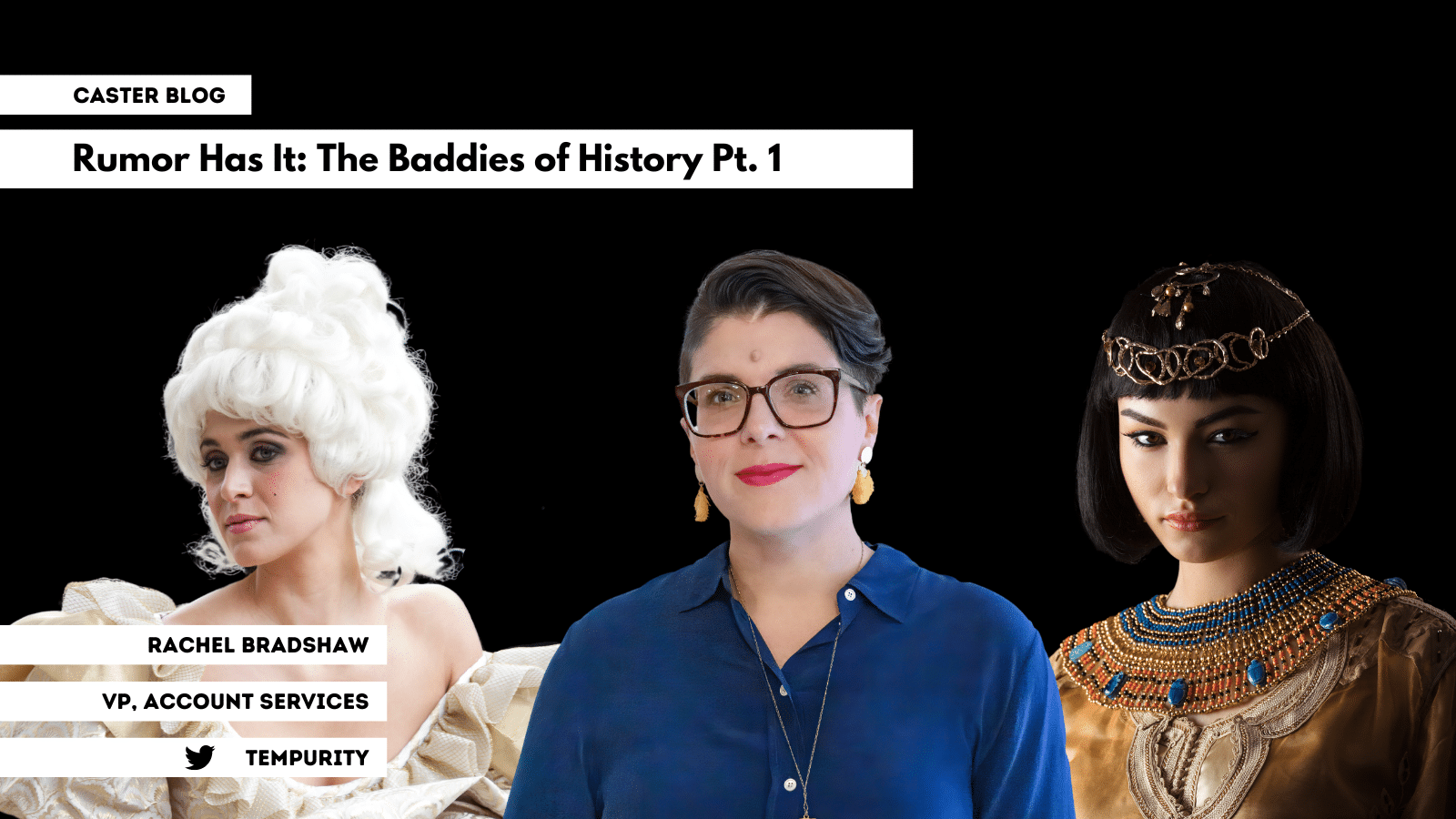
Rumor Has It: The Baddies of History Pt. 1
Let’s play a game of women’s history word association. I’m going to list four powerful women. Your job is to list the first fact that comes to mind about each of them:
- Cleopatra
- Marie Antionette
- Catherine the Great
- Elizabeth Bathory
Now, be honest: Did you recall Cleopatra as a beautiful temptress who seduced the rulers of Rome? Did you think of Marie Antionette quipping “Let them eat cake,” or of Catherine’s, ahem, very close relationship with her horse? And I’m betting you saw Elizabeth Bathory and thought either, “Ah, yes! The Bloody Countess! The Hungarian serial killer who murdered 600 hundred peasants and bathed in the blood of her serving women to stay young,” or “Who?”
If so, game over. None of the above are facts. The most common first thought about each of these powerful women is a rumor invented by her political enemies either after her death to diminish her legacy, or before her death to steal her stuff.
We know these ladies were baddies, but were they bad? In honor of Women’s History Month, Caster is setting the record straight. Buckle up: There’s enough misinformation out there about just these four women that it’s going to take two blogs to cover it all. Let’s dive in.
Cleopatra
Though 20th century filmmakers imagined Cleopatra as an irresistible seductress in the mold of Vivien Leigh or Elizabeth Taylor, Jim Henson was probably closer to the mark:
Like Miss Piggy, Cleopatra was not a traditional beauty—and like Miss Piggy, she was so ferocious, charismatic, ambitious, and smart that it didn’t matter. They also both have majestic noses.
Cleopatra was a political powerhouse long before Julius Caesar showed up: She had already gone from co-ruling Egypt alongside her brother to fighting a civil war for control of the throne. She forged alliances with Roman leaders to supplant her rivals and grow her kingdom, eventually reigning over practically the whole eastern Mediterranean coast. She was a polymath who spoke up to a dozen languages and was educated in classical philosophy and astronomy. Cleopatra far more than her feminine wiles; when her navy was finally defeated by Octavian, she chose death over being displayed as an object in the Emperor’s triumphal parade.
Cleopatra was no cartoon temptress. She was a savvy political operator and military leader who consolidated rule over her country for nearly twenty years. Yes, Julius Caesar and Marc Anthony threw themselves at her feet, but is that really her fault? Or is it just game recognizing game?
Marie Antionette
She didn’t say it. She just didn’t. Jean-Jacques Rousseau attributed the phrase “Qu’ils mangent de la brioche,” or “Let them eat cake,” to an anonymous “great princess” when he wrote Confessions in 1765. At the time, Marie Antionette was an Austrian 10-year-old. Do you really think anyone was consulting her on policy for the French peasantry at the time?
So how did this rumor attach itself to Marie? Rousseau’s book wasn’t published until 20 years after it was written. Marie’s political enemies seized on the catchy line to damage her reputation. In truth, she led a complicated and tragic life. She helped secure French support for the colonists during the American Revolutionary War and increased the political power of France’s common people. She also presided over a lavish court that, even if it didn’t cause the French debt crisis, definitely did not help. There’s a whole, real person underneath that famous, false quote.
The Whole Story
Marie Antoinette and Cleopatra demonstrate how nuance and complexity get flattened. The rumors about them have some bearing in reality – Marie really did love the finer things, and Cleopatra’s Roman boyfriends were obsessed with her – but they’re nowhere close to the whole story.
If there’s no one fighting your corner, diligently bringing new angles and new stories to light, you get reduced to whatever is easiest to remember about you. Unfortunately, that’s usually whatever story is the most shocking. Next week’s baddies are remembered for acts far more out there than blowing off the starving French Peasantry. Is there any truth to the rumors? Tune in to find out.

